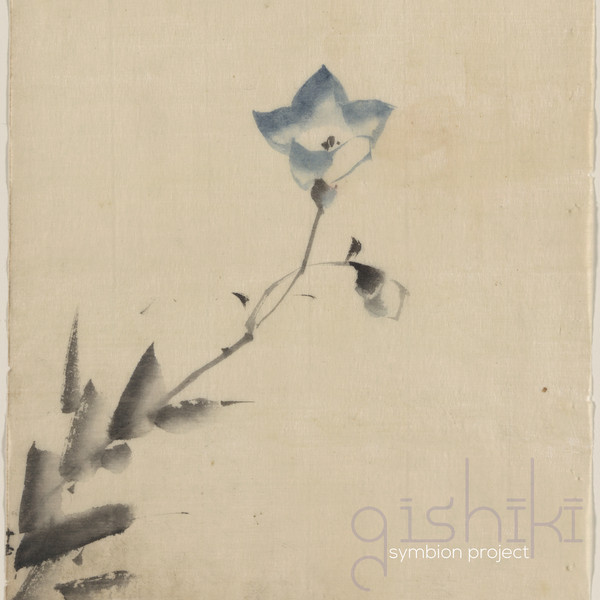
Symbion Project
Gishiki
Album US 2017 on Speed of Dark Music label
Electronic, Folk, World and (Ambient, Experimental)
GISHIKI is the newest album which completes a trilogy of “classical synthesizer” albums started with Wound Up by God or the Devil (2007) & Contrapasso (2011). Inspired by the 8 virtues of Bushido (code of the Samurai) and minimalist traditional Japanese music, Gishiki blends vintage synthesizers, Koto, and windchimes to create lush, cinematic soundscapes. If the novel Neuromancer had a soundtrack, Gishiki would be it. As a forcing-function to explore new realms compositionally, each song began from one of 3 平調子 Hirajōshi pentatonic scales using a plucked Koto sound created by a physical-modeling synthesizer played over beds of recorded/manipulated windchimes & Malaysian angklung. The addition of vintage analog synthesizers adds warmth & texture, helping to create slowly evolving, dynamic pieces with strong leitmotifs. I'd like to spend a moment talking about Gishiki and the album's inception and meaning. Gishiki (儀式) means ritual or ceremony in Japanese and I chose this specific word carefully and deliberately as I wanted to create an album that helps rebuild a ritual and connection with the music we listen to. I've become increasingly frustrated with how music has been de-prioritized as an artform, with its use in our lives as background material for jogging, driving, doing dishes, what-have-you ~ basically, we just don’t sit, relax and focus, and allow the music to take us on a journey, to a new place, to a new state of mind. We don’t give it time to breathe or engage us on new levels. We still go see live performances of music of course, which is great, but seem to focus more on the spectacle through the screens of our phones. There are no galleries for music, where we can momentarily tune out the world, and focus on the art itself, presented in a clean deliberate manner with the world temporarily suspended. Personally, I’ve been reinvigorated by listening to vinyl, not because it sounds better on that medium, but because I quite enjoy the ritual of looking at the album art, placing the record on the turntable, sitting and enjoying the music, getting up 20min or so later to flip the side and then sit back and listen some more. Sitting and listening to a record with a loved one, with a nice glass of red wine, and relaxing while your favorite music plays is one of life’s great joys for me. But creating a ritual for yourself with music can take many forms and I encourage you to find one that brings you joy and allows you to listen with intention. Gishiki was inspired by a few aspects of Japanese culture that reinforce the ceremonial and traditional aspects that I wanted the album to encompass. I was inspired by the meticulous detail and tradition of the Japanese tea ceremony; by the book Hagakure (Way of the Samurai) that then lead me further into Bushido (code of the Samurai) and the 8 tenets of Bushido that inspired the 8 songs/haiku of Gishiki; and lastly by the concept of Hakanai 儚 which evokes the idea of something ephemeral or fleeting but which remains in our minds with traces of bittersweet joy, of melancholic loss, of lingering joy. And of course, traditional Japanese music was very influential in this album with use the use of Koto-esque sounds, wind chimes, and basing the songs on the 3 pentatonic Hirajōshi 平調子 scales. While there is strong Japanese influence in this album, it also embraces my love of vintage synthesizers and minimalist/abstract methods of crafting mood and texture through synthesized landscapes and textural immersion. Bringing everything together is the use of western compositional Leit-Motifs or simple melodies that bind the songs and give them focus and structure. While I hope that listening to the Gishiki album transports you to a new place, even temporarily, through listening to it via iTunes/Spotify/streaming (June 2nd is when this will be available), it’s really the limited edition version of the album that I wanted to help create a strong sense of ritual as part of the listening experience. The limited edition version comes to you wrapped and bound using the Furoshiki 風呂敷 method in custom-created fabric created by textile artists Fiona Stoltze and dyed using the ancient Shibori method. Once you unwrap the cloth, you first see the album which I encourage you to then listen to as you discover the 8 haiku poems for each song. Acclaimed haiku poet Natalia Rudychev composed these unique haiku for each of the songs and I encourage you to explore their meaning and their hakanai as part of the listening experience ~ letting both the song and haiku unfold and expand in your mind. A nice glass of Pinot Noir I can guarantee will help the experience along :) Thank you for reading all this and thinking about how you can create your own musical rituals. お休みなさい
Musicians
 | Symbion Project , album by |
Album Tracks 

| No | Title | Artist | Composer | Duration | |
|---|---|---|---|---|---|
| 1 | 仁 Jin (Benevolence) | Symbion Project | 9:00 | ||
| 2 | 名誉 Meiyo (Honour) | Symbion Project | 4:53 | ||
| 3 | 誠 Makoto (Integrity) | Symbion Project | 5:43 | ||
| 4 | 忠義 Chūgi (Loyalty) | Symbion Project | 9:35 | ||
| 5 | 礼 Rei (Respect) | Symbion Project | 4:01 | ||
| 6 | 自制 Jisei (Self-Control) | Symbion Project | 3:55 | ||
| 7 | 義 Gi (Righteousness) | Symbion Project | 9:52 | ||
| 8 | 勇 Yū (Courage) | Symbion Project | 6:56 |
30sec audio samples provided by ![]()
